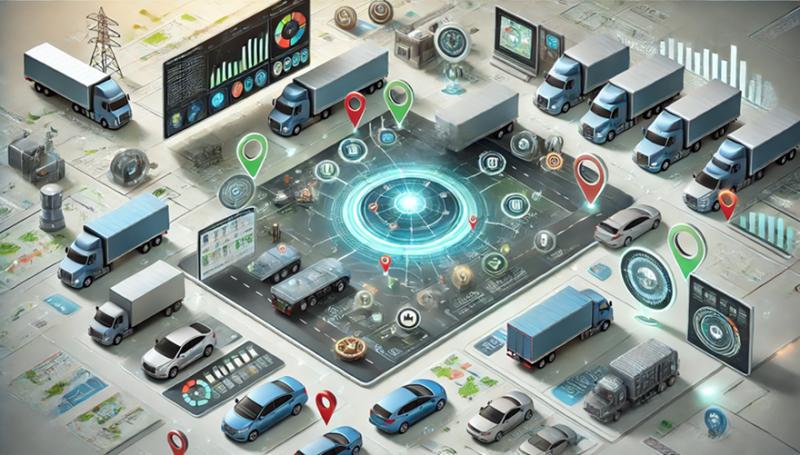Optimizing the Commercial Vehicle Fleet Management Market for the Construct

The Commercial Vehicle Fleet Management Market is undergoing significant changes, especially within the construction industry. Fleet management solutions have become indispensable as construction companies aim to streamline their operations, reduce costs, and improve efficiency. With advancements in technology, fleet managers now have access to a range of tools and solutions that optimize the use of commercial vehicles, reduce downtime, and enhance safety.
Importance of Fleet Management in Construction Industry
In the construction industry, commercial vehicles such as trucks, excavators, loaders, and cranes play a crucial role in daily operations. Managing these vehicles efficiently is key to ensuring timely project delivery, reducing operational costs, and improving profitability. Fleet management systems offer construction companies the ability to track vehicle locations, monitor fuel consumption, plan maintenance schedules, and ensure compliance with safety regulations.
According to BIS Research, the global commercial vehicle fleet management market for construction industry is projected to reach $7.35 billion by 2032 from $3.36 billion in 2023, growing at a CAGR of 8.77% during the forecast period of 2024-2032.
With the construction industry dealing with tight timelines and complex logistical challenges, optimizing vehicle fleets becomes critical. Efficient fleet management can lead to reduced fuel consumption, fewer delays, and lower repair costs—factors that can significantly impact a company’s bottom line.
Innovations Impacting the Commercial Vehicle Fleet Management Industry
GPS Tracking and Route Optimization:
Modern GPS systems go beyond location tracking by providing real-time traffic updates and route optimization.
These tools help construction fleets avoid delays, ensuring timely delivery of materials and equipment for projects.
Route optimization enhances fuel efficiency by guiding vehicles along the most efficient paths, reducing fuel consumption and operational costs.
Blockchain for Fleet Management:
Blockchain technology offers a secure and transparent method for managing fleet data, such as vehicle maintenance records, driver logs, and fuel consumption.
It helps construction companies ensure compliance with safety regulations, prevent fraud, and streamline administrative processes.
Blockchain’s immutable records improve accountability and reduce disputes, which is crucial in construction projects requiring accurate documentation.
Sustainability and Green Fleet Initiatives:
Fleet management solutions now include sustainability metrics, allowing construction companies to track fuel consumption and emissions.
Green fleet initiatives, like using alternative fuels or electric vehicles, are growing in response to environmental concerns and regulatory requirements.
Prioritizing sustainability reduces environmental impact and leads to long-term cost savings through decreased fuel usage and maintenance expenses.
Global Market Segmentation
Segmentation 1: by Product
Hardware
Software
Services
Others
Segmentation 2: by Region
North America
Europe
Asia-Pacific
Middle East
Africa
Latin America
Rest of the World
Latest Trends in the Commercial Vehicle Fleet Management Market for Construction
Telematics and IoT Integration:
Telematics, paired with IoT technologies, enables fleet managers to monitor real-time data on vehicle performance, location, and driver behavior in construction fleets.
IoT sensors track fuel usage, engine health, and tire pressure, optimizing vehicle usage and allowing for proactive maintenance, reducing breakdowns and costs.
By tracking driver habits, telematics improves safety, alerting managers to risky behaviors and ensuring efficient operation of both vehicles and drivers.
Predictive Maintenance:
Predictive maintenance leverages data analytics and AI to forecast when a vehicle may need servicing, helping construction fleets avoid unscheduled breakdowns.
This approach reduces downtime and delays, allowing maintenance to be scheduled during non-critical periods, ensuring vehicles are always in optimal condition when needed.
Electric and Hybrid Commercial Vehicles:
The adoption of electric and hybrid vehicles is growing in construction fleets, driven by the need to reduce environmental impact and comply with emissions regulations.
Electric vehicles offer benefits like lower fuel costs, reduced emissions, and less maintenance, making them ideal for urban construction projects where emissions standards are stricter.
Get more insights on the Automotive Market Research Reports.
Fleet Optimization Software:
Fleet optimization software centralizes fleet management, enabling route planning, fuel monitoring, and real-time tracking of vehicles and driver behavior.
This software helps construction companies reduce costs, avoid delays, and improve resource coordination, while providing insights for improving operational efficiency and productivity.
Automation and AI in Fleet Management:
AI-driven fleet systems analyze data to predict maintenance, optimize routes, and improve vehicle performance in construction fleets.
Automation tools like drones and autonomous vehicles are emerging, offering potential for reducing labor costs, improving efficiency, and enhancing project accuracy through automated site surveys and monitoring.
Conclusion
The Commercial Vehicle Fleet Management Industry for the construction industry is evolving rapidly, with new technologies and innovations driving increased efficiency, safety, and sustainability. From the adoption of telematics and predictive maintenance to the integration of electric vehicles and AI-driven systems, the construction industry is leveraging these advancements to optimize fleet operations.
As the demand for more efficient and eco-friendly construction practices grows, fleet management will continue to play a critical role in helping companies meet project deadlines, reduce costs, and operate more sustainably. By staying ahead of these trends, construction companies can ensure they remain competitive in an increasingly complex and technology-driven market.




Comments